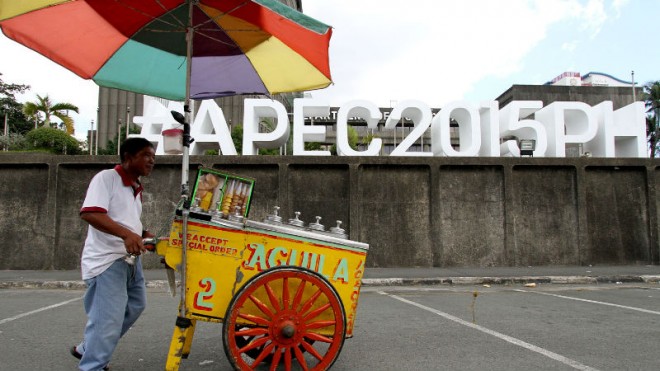
A man sells dirty ice cream near the venue of Asia Pacific Economic Cooperation summit 2015 in Pasay City. 21 head of states will be arrive in the country including US President Barrack Obama. INQUIRER PHOTO / RICHARD A. REYES
ROXAS Boulevard will be a no-man’s land starting today (Monday) until Nov. 20 after the Manila City government announced that pedestrians, aside from motorists, will be banned from the area as part of security measures for the Asia-Pacific Economic Cooperation (Apec) meet.
“In compliance with the directive of Mayor [Joseph] Estrada and national authorities for our office to fully help in ensuring safety for Apec, we are closing Roxas Boulevard not only to vehicular traffic but also to foot traffic,” said Johnny Yu, the head of the Manila Disaster Risk Reduction and Management Office.
“Motorists and pedestrians are temporarily prohibited from using Roxas Boulevard [from Kalaw to P. Ocampo Street]. Swimming in Manila Bay is still not allowed. Romantic dates are also not allowed,” he added.
Policemen will be deployed to the area to keep the thoroughfare free of people and vehicles. No fines or penalties, however, will be imposed.
Yu said this was the “first time” that the bay area would be closed to pedestrians for a special occasion. The declaration of a “no-walk” zone in the Baywalk portion of Roxas Boulevard has often been reserved for calamities but Manila officials imposed the restriction after a recommendation “from the different members of the joint task force overseeing the safety and security component requirements for the Apec events.”
Even joggers will be banned from the area while only accredited Apec personnel in charge of security and with proper identification cards will be allowed there for the duration of the international meet.
Roxas Boulevard in Manila is home to key establishments and facilities. The US Embassy is located in the area as well as a number of hotels where some Apec delegates will be staying.
“I am appealing to Manilans and to the public in general to cooperate with national and city authorities who are working to ensure the safety and security of Apec delegates, spouses and coterie of officials,” Estrada said in a statement.
“This time, we should give way to our foreign dignitaries so they and the whole world will appreciate the beauty and splendor of the finest harbor in the Far East,” he added.
In Pasay City where most of the venues for Apec-related activities are located, more than 1,000 policemen will be deployed around the Mall of Asia Arena and the Philippine International Convention Center to make sure that the international event will be held peacefully.
Pasay City police chief Senior Supt. Joel Doria told the Inquirer that the deployment was mainly aimed at deterring crimes.
“We also have covert security around the entire city, especially near Apec venues. Police personnel from various regions have also been detailed to help us augment the number of police personnel for the event,” he said.
He added that they were also closely monitoring information about illegal activities or protests in the city during the summit from Nov. 17 to 20.
Earlier, Doria said that his men would be strictly implementing the “no permit, no rally” policy near the Apec venues and in other parts of the city.
Some 600 traffic enforcers in Makati, on the other hand, will be deployed near hotels where some of the delegates will be staying.